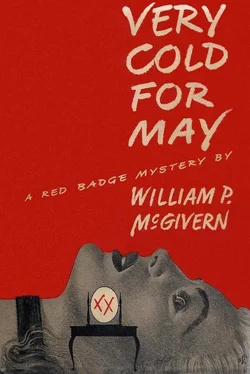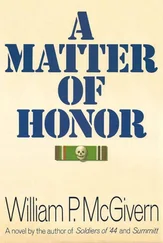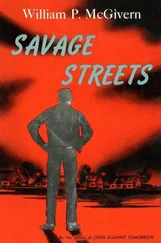William P. McGivern
Very Cold for May
Jake Harrison picked up his hat and coat from the cloakroom attendant and was walking across the lobby of the Saxon Club when he heard his name called. He turned as a blue-uniformed page hurried to his side.
“Call for you, Mr. Harrison. A Mr. Noble.”
Jake hesitated and in that fraction of time a good deal of his amiability departed. Finally, he said, “Okay, thanks,” and went over to the bank of phones beside the elevator.
Before lifting the receiver he checked through the events of the day in an attempt to guess what Noble wanted him for; but the day had been without incident, neither more nor less frantic than usual.
Shrugging, he lifted the phone and told the club operator he was on the line. She asked him to wait a moment and he heard a click as the connection was made. Then Gary Noble’s voice blasted into his ear.
“Jake? How soon can you get down to the office?”
“Oh, hell,” Jake said.
“Jake, I wouldn’t bother you if it wasn’t important.”
“Oh, sure. Look, I’ve an eight o’clock date with Sheila at Dave’s. What’s up?”
“I’m sorry about lousing up your plans,” Noble said, with somewhat too much solicitude. “But listen; Riordan, Dan Riordan, called a while ago and wants to see me tonight. He wants us to handle his public relations. You know this is the biggest damn thing that ever happened to me, Jake. Riordan owns mills, mines, factories—”
“Yes, I know,” Jake said. Noble’s enthusiasm was working insidiously, and he began, almost against his will, to fish up the things he knew about Dan Riordan.
War Contractor. Genius of Production. Free Enterprise. Know-How. Money. Married after first wife’s death. To entertainer, show girl, something like that. Son in Air Force. Good war record.
“What’s his trouble?” he asked.
“Well, we didn’t go into the details, but the Hampstead Committee wants a look at his books. You know what that usually means.”
“He’ll need a lot of help, then.”
“You’ve got to get over here,” Noble said.
Outside Jake could see light, picturesque snow falling on Michigan Boulevard and the hazy street lamps lent a pleasant, Dickensian flavor to the scene. He sighed.
“Okay. I can make it in fifteen or twenty minutes.”
“One other thing, Jake.” Noble sounded both cautious and puzzled. “He mentioned May. May Laval. Said something about her being in a spot to hurt him. Asked me if I knew her, and so forth.”
Jake said, “That fits in with the rumors, doesn’t it?”
“You mean about that book she’s planning — the expose on high living during the war?”
“Sounds logical,” Jake said. “I’ll get over as quickly as I can.”
He hung up, then called another number. A moment later a quiet voice said, “Dave’s Radio Bar. Dave speaking.”
“Dave, this is Jake. I’d like you to do me a favor. Sheila and I planned to meet at your place at eight. But I’m tied up now and—”
“You want me to tell her you’ll be along soon?”
Jake smiled. “I couldn’t have put it more neatly myself.”
“Well, I’ll tell her, but this kind of stuff is why she left you in the first place. She’s nobody to push around like a call girl.”
“You’re right, Dave,” Jake said. “But take care of her, will you?”
He put the phone down and shrugged. That was the best he could do for the moment. Sheila would probably understand.
Waiting at the curb in the fight snow while the doorman signalled a cruising cab, Jake thought about the news he’d got from Gary Noble and a small frown touched his face. He was a slender, gracefully built man in his late thirties, with graying hair and lean features that were saved from austerity by a normal expression of good humor.
But he wasn’t looking particularly good-humored as he climbed into the cab and gave directions to the driver. He was thinking of what Noble had told him about May Laval. Except for that, the Riordan account would be a routine chore.
But the element of May in the equation made everything else unstable.
The cab made a U-turn in Michigan Boulevard and headed north toward the Executives’ Building. Jake lit a cigarette and glanced out at the dark bulk of Lake Michigan and the traffic that formed a chain of light along its shore.
He had known May Laval quite a few years. Ten, at least, he thought. She was about his own age, thirty-eight. The facts about May were not too mysterious. She had come from California to Chicago as a girl of nineteen, a very beautiful girl with golden hair and large candid eyes that had surveyed everything in the city with delighted astonishment.
She had gotten into a few shows on the merits of her beauty, which was real and fresh, and after her third show closed, had surprised quite a few people by marrying its backer, an elderly meat packer. The marriage hadn’t lasted long, and May had come out of it on the way to being a wealthy woman. She had proved then that there was something behind her big blue eyes, by investing her money shrewdly in South Side real estate that doubled in value within a few years. Jake had met her about that time, which was shortly after her second marriage to an orchestra leader had turned out badly. He had liked her, and they became firm but casual friends.
May’s talent as news copy always astounded Jake, who was doing features for the Express at the time. She had a flair, or rather a passion, for weird and dizzy escapades. Her antics could range from a nude and nocturnal bathing party in Chicago’s Buckingham Fountain, to the successful bidding for a Poe first edition that every bibliophile in the country had wanted. May had color.
She became known over those years as a character’s character. Her plushy Victorian home on Astor Street was crowded with politicians, judges, gamblers, newspapermen and, for variety, there might be a handful of derelicts picked up personally by her from West Side soup lines. May knew everybody; everybody knew May.
During the war she reached her zenith as a colorful personality. She was unofficial hostess to the important men who came to Chicago to buy and sell properties in seven figures, a Girl Friday to the men fighting the war of priorities, allocations, contracts, and logistics.
It was said that a meeting of the Allied Chiefs of Staff might have been held in her parlor on a dozen different occasions. It was said she knew the tastes in women of every general in the army above the rank of brigadier. And it was said she had made a killing in the market with tips from contractors and brokers, who exchanged this information in return for the right word in the right ear at the right time.
The end of the war seemed to bring May’s era of curious importance to a close. The press was slightly weary of her, and there was competition from returning G I’s, from strikes, readjustment, and the other agonies of peace. The days passed when May’s name could be found in three or four columns in every edition of every paper in town.
Jake realized that he had hardly seen May since the end of the war. She had made a few sporadic attempts to recapture the attention that had always been part of her life, and then she’d gone to Sun Valley.
That had been all, until the rumor of her book began to float around. According to the vague but prurient reports, the book would be one to end all books on the war. It was to be an expose, based on her diaries, with names, dates and telephone numbers, of chicanery and fornication on the highest of levels. It was to be Madame Récamier telling all in four-letter words.
Jake tossed his cigarette out the cab window. He couldn’t help but be amused with May’s latest brain storm, even though it was likely to embarrass their prospective client, Dan Riordan.
Читать дальше












